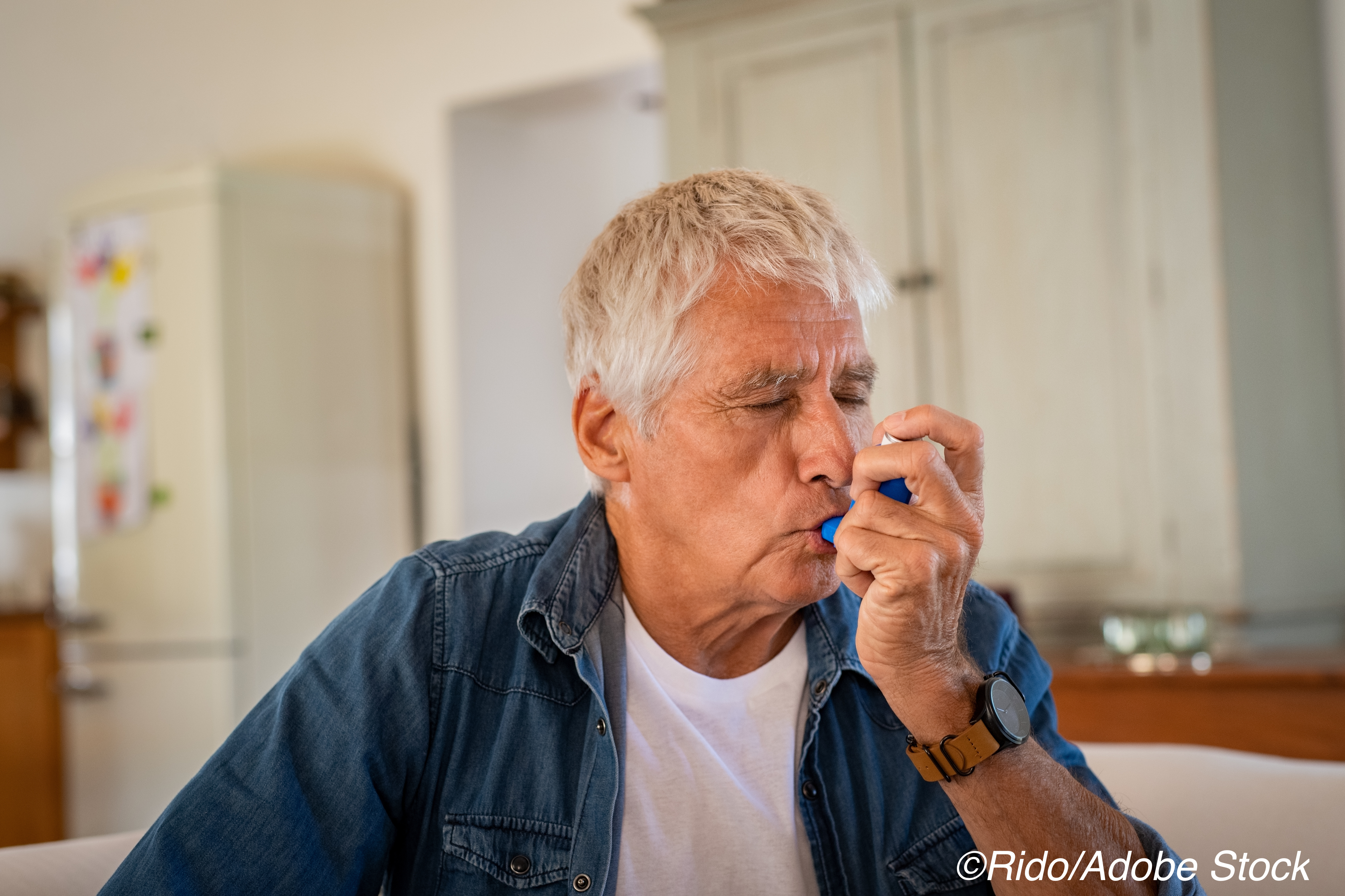 A sensitivity analysis of phase 3 findings from the 52-week ETHOS trial confirmed initial trial results suggesting a mortality benefit with inhaled triple-therapy with higher (320 μg) doses of the steroid budesonide in patients with moderate to very severe COPD.
A sensitivity analysis of phase 3 findings from the 52-week ETHOS trial confirmed initial trial results suggesting a mortality benefit with inhaled triple-therapy with higher (320 μg) doses of the steroid budesonide in patients with moderate to very severe COPD.
The supplementary mortality analysis, along with other phase 3 ETHOS findings, will be presented at ATS 2020, the international, virtual meeting of the American Thoracic Society. Conference sessions are scheduled for August 5-10.
Triple therapy with budesonide, glycopyrrolate and formoterol metered dose inhaler was found to reduce all-cause mortality risk at the budesonide 320 μg dose in the ETHOS study, but not at the lower 160 μg dose.
The trial compared twice-daily treatment with the triple therapy at the 2 budesonide doses with 2 dual therapy inhaled treatments: the long-acting muscarinic antagonist (LAMA) glycopyrrolate plus the long-acting β2 agonist (LABA) formoterol or formoterol plus budesonide at the 320/9.6 μg in patients who had experienced at least 1 moderate to severe COPD exacerbation in the year prior to study entry.
At either budesonide dose, the triple therapy was associated with a lower rate of moderate to severe COPD exacerbations, compared to either dual therapy in the original phase 3 ETHOS findings, but the suggestion of mortality benefit was seen only at the higher budesonide dose.
Based on the strength of the phase 3 data from the ETHOS trial, on July 24 the FDA approved the triple therapy, marketed as Breztri Aerosphere, for maintenance therapy in patients with COPD.
The company’s application for approval was initially rejected by the FDA in October of last year, based on concerns that the earlier KRONOS trial phase 3 findings failed to show clear benefits for the triple therapy over dual treatments.
“Preventing exacerbations is central to the management of chronic obstructive pulmonary disease,” said ETHOS lead investigator Fernando J. Martinez, MD, of New York City’s Weill Cornell Medicine, in a press release. “Even a single exacerbation can have a negative impact on a patient’s lung function and quality of life, and it can increase the risk of death.”
In an interview with BreakingMED, ATS 2020 conference organizer Andrew Halayko, MD, of the University of Manitoba, said fixed-dose triple ICS/LAMA/LABA therapy represents a game changer for the treatment of certain patients with COPD.
In the abstract of their sensitivity analysis presented at ATS 2020, Martinez and colleagues noted that “given the clinical importance of this (mortality) endpoint and the low mortality rate relative to the number of patients censored prior to day 351, we evaluated the impact of censored data in this analysis by obtaining supplemental vital status information.”
In the original study analysis, 384 patients were censored prior to day 351 of the trial.
In the supplemental vial status database, 30 patients remained censored, representing o.35% of the intention-to-treat population of 8,509 patients (mean age, 65 years, 59.7% male).
The metered-dose triple therapy at the 320/18/9.6 μg dose was associated with significant reductions in all cause death risk versus dual therapy with glycopyrrolate/formoterol fumarate (GFF) over 52 weeks in the original analysis (hazard ratio 0.54; 95% CI, 0.34-0.87; 46% reduction, unadjusted; P=0.011).
When supplemental vital status data were included, the observed reduction in all-cause mortality remained (HR, 0.51; 95% CI, 0.33-0.8, 49% reduction, unadjusted; P=0.0035).
Treatment differences for triple therapy with the higher budesonide dose versus dual budesonide/formoterol fumarate metered dose inhaler therapy did not reach significance. Nor did treatment differences for fixed triple-therapy at the lower budesonide dose versus either dual therapy.
“This supplemental mortality analysis, including vital status after 1 year of treatment for 99.6% of patients overall, demonstrated that budesonide/glycopyrrolate/formoterol metered dose inhaler 320/18/9.6 μg reduced the risk of all-cause mortality versus LAMA/LABA in patients with moderate-to-very severe COPD and previous history of moderate to severe exacerbations,” Martinez and colleagues noted.
-
A sensitivity analysis of phase 3 findings from the 52-week ETHOS trial confirmed initial trial results suggesting a mortality benefit with inhaled triple-therapy.
-
Triple ICS/LAMA/LABA therapy with higher (320 μg) doses of the steroid budesonide, but not lower doses (160 μg), was associated with a reduced risk of death in patients with moderate to very severe COPD.
Salynn Boyles, Contributing Writer, BreakingMED™
The ETHOS trial and the sensitivity analysis was funded by AstraZeneca.
Researcher Fernando J. Martinez reported receiving grants from AstraZeneca, during the conduct of the study; personal fees, non-financial support and other from AstraZeneca, other from Afferent/Merck, personal fees, non-financial support and other from Boheringer Ingelheim, other from Bristol Myers Squibb, non-financial support and other from Chiesi, personal fees and non-financial support from Canadian Respiratory Society, personal fees and non-financial support from CME Outfitters, personal fees and non-financial support from CSL Behring, personal fees from Dartmouth University, personal fees from France Foundation, personal fees from Gala, personal fees and non-financial support from Genentech, grants, personal fees, non-financial support and other from GlaxoSmithKline, personal fees and non-financial support from Inova Fairfax, personal fees and non-financial support from MDMagazine, personal fees and non-financial support from NYP Methodist Hospital Brooklyn, personal fees and non-financial support from Miller Communications, personal fees and non-financial support from National Association for Continuing Education, other from Nitto, personal fees and non-financial support from Novartis, personal fees from New York University, personal fees and non-financial support from Patara/Respivant, personal fees from Pearl, personal fees and non-financial support from Peer View, personal fees from Physicians Education Resource, personal fees from ProMedior, personal fees and non-financial support from Rare Diseases Healthcare Communications, personal fees from Rockpointe Communications, personal fees and non-financial support from Sanofi/Regeneron, other from Biogen, personal fees and non-financial support from Sunovion, personal fees and non-financial support from Teva, other from twoXR, personal fees and non-financial support from University of Birmingham Alabama, personal fees from UpToDate, non-financial support from Veracyte, personal fees from Vindico, personal fees and non-financial support from WebMD/ MedScape, non-financial support and other from Zambon, non-financial support from ProTerrix Bio, outside the submitted work.
Researcher Klaus Rabe reported receiving grants and personal fees from Boehringer Ingelheim, grants and personal fees from Astra Zeneca, personal fees from Novartis, personal fees from Chiesi Pharmaceuticals, personal fees from Sanofi, personal fees from Roche, personal fees from Regeneron, outside the submitted work.
Cat ID: 154
Topic ID: 89,154,730,192,154,195,199,489,925,198


